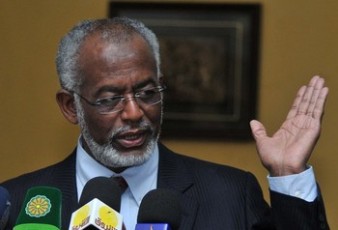Comprehensive process to implement cooperation agreements is crucial: Sudan FM
July 29, 2013 (KHARTOUM) – Sudanese foreign minister Ali Karti again called on the South to fully implement the terms of a cooperation agreements signed between the two countries, saying Sudan would continue to block the exportation of South Sudanese unless Juba ended its alleged support to rebel groups.

Speaking to the state-owned SUNA from Addis Ababa, Sudanese ambassador to the African Union Abdallah Wadi said Karti told the meeting that “The cooperation agreements between the two countries should be implemented as one package without any selectivity”.
, said
Khartoum says Juba should also commit itself to the security arrangements, including ending its alleged support to rebel groups and the activation of a buffer zone, adding that Juba’s refusal to accept the colonial borders of some disputed areas has made it difficult to establish the centreline of the demilitarised zone.
Sudanese president Omer Al-Bashir last May said Juba continues to provide support to rebel groups, ordering a stop on oil flows by 7 August. However, he recently agreed to delay the deadline for two weeks until 22 August, following a visit by the Ethiopian foreign minister and the chairman of the AU panel to Khartoum.
Wadi said that the minister expressed hopes that Juba uses this opportunity to address the issues that led to the suspension of oil flows through the Sudanese territory.
Juba has repeatedly denied providing any support to rebels from the Sudanese Revolutionary Front (SRF), accusing Khartoum in turn of supporting a rebellion in Jonglei state led by David Yau Yau. Have denied the claims, saying they do not fit with the reality.
According to Wadi, Mbeki told the AUPSC meeting that counter accusations of support to rebel groups had hindered the implementation of the cooperation agreements signed on 27 September 2012.
SPLM-N REBELS IN ADDIS ABABA
The rebel Sudan People’s Liberation Movement –North (SPLM-N) on Monday announced that its leadership had arrived in Addis Ababa for consultations with Mbeki, who is tasked with resolving the conflict in Sudan’s Blue Nile and South Kordofan states.
SPLM-N leader Malik Agar, his deputy, Abdel Aziz El-Hilu, and secretary-general Yasir Arman will also meet with Ethiopian officials and the members of the AUPSC.
In a press statement released after their arrival, Arman said the SPLM-N carried a message to regional and international parties that “Sudanese people are fed up with partial solutions which have harmed the present and the future of Sudan”.
The SPLM-N and its allied rebel groups call for a comprehensive process that involves opposition parties to resolve conflicts in Darfur, Blue Nile and South Kordofan and re-establish a democratic regime in Sudan.
This approach has garnered support by some western countries, but was recently rejected by the AUPSC which calls on regional conflicts to be settled first before proceeding with democratic reforms.
(ST)
